Many of us are innately interested in sex, and hence I’ve created a listing of some movies that has theme around human sexuality. It is by no means comprehensive so do share if you like to add more titles to this list. Do reshare if you feel it will help more people interested in learning about human sexuality through movies.
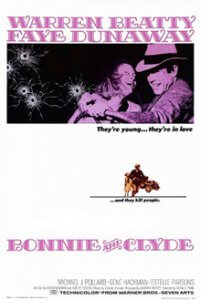
1. Bonnie and Clyde (1967), In the middle of the Great Depression, Clyde Barrow (Warren Beatty) and Bonnie Parker (Faye Dunaway) meet when Clyde tries to steal Bonnie’s mother’s car. Bonnie, who is bored by her job as a waitress, is intrigued by Clyde, and decides to take up with him and become his partner in crime. They pull off some holdups, but their amateur efforts, while exciting, are not very lucrative.
The duo’s crime spree shifts into high gear once they hook up with a dim-witted gas station attendant, C.W. Moss (Michael J. Pollard), then with Clyde’s older brother Buck (Gene Hackman) and his wife, Blanche (Estelle Parsons), a preacher’s daughter. The women dislike each other on first sight, and their feud only escalates from there: shrill Blanche has nothing but disdain for Bonnie, Clyde and C.W., while gun-moll Bonnie sees Blanche’s flighty presence as a constant danger to the gang’s well-being.
Bonnie and Clyde turn from pulling small-time heists to robbing banks. Their exploits also become more violent. When C.W. botches a bank robbery by parallel parking the getaway car, Clyde shoots the bank manager in the face after he jumps onto the slow-moving car’s running board. The gang is pursued by law enforcement, including Texas Ranger Frank Hamer (Denver Pyle), whom they capture and humiliate before setting him free. A raid later catches the outlaws off guard, mortally wounding Buck with a gruesome shot to his head and injuring Blanche. Bonnie, Clyde and C.W. barely escape with their lives. With Blanche sightless and in police custody, Hamer tricks her into revealing C.W.’s name, who was up until now still only an “unidentified suspect.”
Hamer locates Bonnie, Clyde and C.W. hiding at the house of C.W.’s father Ivan Moss (Dub Taylor), who thinks the couple—and an ornate tattoo—have corrupted his son. The elder Moss strikes a bargain with Hamer: in exchange for leniency for the boy, he helps set a trap for the outlaws. When Bonnie and Clyde stop on the side of the road to help Mr. Moss fix a flat tire, the police in the bushes open fire and riddle them with bullets. Hamer and his posse then come out of hiding, looking pensively at the couple’s bodies.
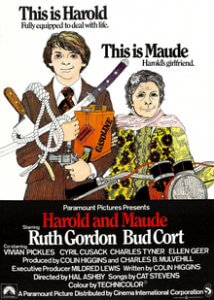 2. Harold and Maude (1971), Harold Chasen is a young man obsessed with death. He stages elaborate fake suicides, attends funerals, and drives a hearse, all to the chagrin of his socialite mother. His mother sets up appointments with a psychoanalyst, but the analyst is befuddled by the case and fails to get Harold to talk about his real emotions.
2. Harold and Maude (1971), Harold Chasen is a young man obsessed with death. He stages elaborate fake suicides, attends funerals, and drives a hearse, all to the chagrin of his socialite mother. His mother sets up appointments with a psychoanalyst, but the analyst is befuddled by the case and fails to get Harold to talk about his real emotions.
At another stranger’s funeral service, Harold meets Maude, a 79-year-old woman who shares Harold’s hobby of attending funerals. He is entranced by her quirky outlook on life, which is bright and excessively carefree in contrast with his morbidity. The pair form a bond and Maude shows Harold the pleasures of art and music (including how to play banjo), and teaches him how to “[make] the most of his time on earth”. Meanwhile, Harold’s mother is determined, against Harold’s wishes, to find him a wife. One by one, Harold frightens and horrifies each of his appointed dates, by appearing to commit gruesome acts such as self-immolation, self-mutilation and seppuku. She tries enlisting him in the military instead, but he deters his recruiting officer uncle by staging a scene in which Maude poses as a pacifist protester and Harold seemingly murders her out of militaristic fanaticism.
When Harold and Maude are talking at her home he tells her, without prompting, the motive for his fake suicides: When he was at boarding school, he accidentally caused an explosion in his chemistry lab, leading police to assume his death. Harold returned home just in time to witness his mother react to the news of his death with a ludicrously dramatized faint. As he reaches this part of the story, Harold bursts into tears and says, “I decided then I enjoyed being dead.”
As they become closer, their friendship soon blossoms into a romance and Harold announces that he will marry Maude, resulting in disgusted outbursts from his family, analyst, and priest. Maude’s 80th birthday arrives, and Harold throws a surprise party for her. As the couple dance, Maude tells Harold that she “couldn’t imagine a lovelier farewell.” Confused, he questions Maude as to her meaning and she reveals that she has taken an overdose of sleeping pills and will be dead by morning. She restates her firm belief that eighty is the proper age to die.
Harold rushes Maude to the hospital, where she is treated unsuccessfully and dies. In the final sequence, Harold’s car is seen going off a seaside cliff but after the crash, the final shot reveals Harold standing calmly atop the cliff, holding his banjo. After gazing down at the wreckage, he dances away, picking out on his banjo Cat Stevens’ song “If You Want to Sing Out, Sing Out”.
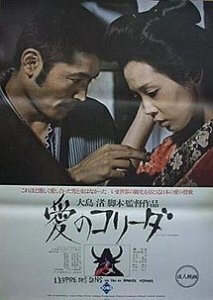 3. In the Realm of the Senses (1976), (French: L’Empire des sens, Japanese: 愛のコリーダ, Ai no korīda, “Corrida of Love”) is a 1976 French-Japanese art film written and directed by Nagisa Oshima. It is a fictionalised and sexually explicit treatment of an incident from 1930s Japan, that of Sada Abe. It generated great controversy during its release; while intended for mainstream wide release, it contains scenes of unsimulated sexual activity between the actors (Tatsuya Fuji and Eiko Matsuda, among others).
3. In the Realm of the Senses (1976), (French: L’Empire des sens, Japanese: 愛のコリーダ, Ai no korīda, “Corrida of Love”) is a 1976 French-Japanese art film written and directed by Nagisa Oshima. It is a fictionalised and sexually explicit treatment of an incident from 1930s Japan, that of Sada Abe. It generated great controversy during its release; while intended for mainstream wide release, it contains scenes of unsimulated sexual activity between the actors (Tatsuya Fuji and Eiko Matsuda, among others).
A former prostitute (Eiko Matsuda), now working as a servant, begins a torrid affair with her married employer (Tatsuya Fuji).
30. The Big Chill (1983), American comedy-drama film directed by Lawrence Kasdan, starring Tom Berenger, Glenn Close, Jeff Goldblum, William Hurt, Kevin Kline, Mary Kay Place, Meg Tilly, and JoBeth Williams. The plot focuses on a group of baby boomers who attended the University of Michigan, reuniting after 15 years when their friend Alex commits suicide. Kevin Costner was cast as Alex, but all scenes showing his face were cut. It was filmed in Beaufort, South Carolina.
The soundtrack features soul, R&B, and pop-rock music from the 1960s and 1970s, including tracks by Creedence Clearwater Revival, Aretha Franklin, Marvin Gaye, The Temptations, The Rolling Stones, and Three Dog Night.
The Big Chill was adapted for television as the short-lived 1985 CBS series Hometown. Later, it influenced the TV series thirtysomething.
A once close-knit gang of friends — including an actor (JoBeth Williams), a doctor (Glenn Close) and her husband (Kevin Kline), a Vietnam veteran (William Hurt), and a journalist (Tom Berenger) — meets for a weekend after the funeral of their much-envied friend Alex, who committed suicide. The friends spend the weekend confronting the personal truths, sacrifices and betrayals that have left them disenchanted. Each must contend with unresolved issues they have with Alex, and with one another.
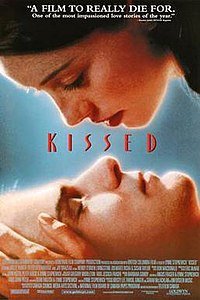 4. Kissed (1996), Teenager Sandra (Molly Parker) is obsessed with death, so much so that after wandering into a funeral home she wishes to be a mortician. But this fascination becomes highly sexual, as Sandra develops a taste for necrophilia. Her secret passion doesn’t cause any problems until she goes to college and meets medical student Matt (Peter Outerbridge), who soon falls for the unusual young lady. She comes clean about her morbid sexuality, but turning her on to the world of the living is no easy task.
4. Kissed (1996), Teenager Sandra (Molly Parker) is obsessed with death, so much so that after wandering into a funeral home she wishes to be a mortician. But this fascination becomes highly sexual, as Sandra develops a taste for necrophilia. Her secret passion doesn’t cause any problems until she goes to college and meets medical student Matt (Peter Outerbridge), who soon falls for the unusual young lady. She comes clean about her morbid sexuality, but turning her on to the world of the living is no easy task.
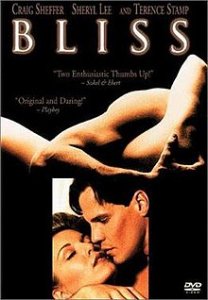 5. Bliss (1997). American erotic drama film written and directed by Lance Young, in his film debut. It stars Sheryl Lee, Craig Shefferand Terence Stamp. The film also features appearances by Lance Young’s sister, Leigh Taylor-Young, as well as Molly Parker. The story revolves around a young married couple who are trying to address issues impacting their sex life. The film is also a surreptitious analysis on the teachings of tantric sex.
5. Bliss (1997). American erotic drama film written and directed by Lance Young, in his film debut. It stars Sheryl Lee, Craig Shefferand Terence Stamp. The film also features appearances by Lance Young’s sister, Leigh Taylor-Young, as well as Molly Parker. The story revolves around a young married couple who are trying to address issues impacting their sex life. The film is also a surreptitious analysis on the teachings of tantric sex.
Media attention on the film was limited yet the reception was divided among the critics. It was screened during the opening of the San Francisco International Film Festival.
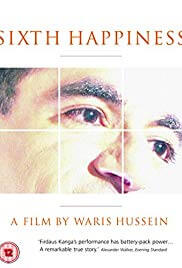 6. Sixth Happiness (1997) is a film about Brit, a boy born with brittle bones who never grows taller than four feet, and his sexual awakening as family life crumbles around him. It is also about the Parsi or Parsees – descendants of the Persian empire who were driven out of Persia by an Islamic invasion more than a thousand years ago and settled in western India. Parsees had a close relationship with the British during the years of the Raj. Brit is named by his mother, both after his brittle bones, and in tribute to his mother’s love of Britain.
6. Sixth Happiness (1997) is a film about Brit, a boy born with brittle bones who never grows taller than four feet, and his sexual awakening as family life crumbles around him. It is also about the Parsi or Parsees – descendants of the Persian empire who were driven out of Persia by an Islamic invasion more than a thousand years ago and settled in western India. Parsees had a close relationship with the British during the years of the Raj. Brit is named by his mother, both after his brittle bones, and in tribute to his mother’s love of Britain.
Brit’s family is non-stereotypical: his parents are ardent Anglophiles with fond memories of the Raj and World War II. Brit is bright, spiky, opinionated and selfish with a razor-sharp wit, never a martyr or victim. He prefers the Kama Sutra to Shakespeare and does not allow gender or disability to come in the way of his desire for sex and love.
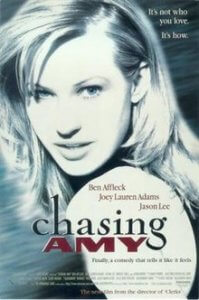 7. Chasing Amy (1997), American romantic comedy-drama film written and directed by Kevin Smith and starring Ben Affleck, Joey Lauren Adams, and Jason Lee. The film is about a male comic artist (Affleck) who falls in love with a lesbian/bisexual woman (Adams), to the displeasure of his best friend (Lee). It is the third film in Smith’s View Askewniverse series.
7. Chasing Amy (1997), American romantic comedy-drama film written and directed by Kevin Smith and starring Ben Affleck, Joey Lauren Adams, and Jason Lee. The film is about a male comic artist (Affleck) who falls in love with a lesbian/bisexual woman (Adams), to the displeasure of his best friend (Lee). It is the third film in Smith’s View Askewniverse series.
The film was originally inspired by a brief scene from an early film by a friend of Smith’s. In Guinevere Turner’s Go Fish, one of the lesbian characters imagines her friends passing judgment on her for “selling out” by sleeping with a man. Smith was dating Adams at the time he was writing the script, which was also partly inspired by her.
The film won two awards at the 1998 Independent Spirit Awards (Best Screenplay for Smith and Best Supporting Actor for Lee).
A comic-book writer stumbles upon the love of his life, only to discover that she is gay. The situation is acerbated by his roommate and professional partner who becomes increasingly threatened by the possibility that he will be replaced. The third film in writer-director’s New Jersey trilogy, following on from `Clerks’ and `Mallrats’.
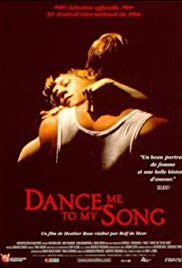 8. Dance Me to My Song (1998), Another much-discussed film, but this one with a happy ending, is Rolf de Heer’s “Dance Me to My Song,” an extraordinary Australian work that was written by Heather Rose, who also stars in it—even though she has cerebral palsy, and communicates through a computer and a speaking machine. As the film opens, she’s at the mercy of a stupid and cruel “care giver” who neglects and insults her. Using her motorized wheelchair and her lively intelligence, she tries to figure a way out of her dilemma. In the opening shot, the heroine seems hopeless and alien. By the end, we identify more with her than with the normals in the story.
8. Dance Me to My Song (1998), Another much-discussed film, but this one with a happy ending, is Rolf de Heer’s “Dance Me to My Song,” an extraordinary Australian work that was written by Heather Rose, who also stars in it—even though she has cerebral palsy, and communicates through a computer and a speaking machine. As the film opens, she’s at the mercy of a stupid and cruel “care giver” who neglects and insults her. Using her motorized wheelchair and her lively intelligence, she tries to figure a way out of her dilemma. In the opening shot, the heroine seems hopeless and alien. By the end, we identify more with her than with the normals in the story.
Writer/director Rolf de Heer’s acclaimed 1998 drama Dance Me to My Song presents the fascinating possibility the debate could extend further than race and into other areas such as disability. An achingly genuine and profoundly moving drama about a woman born with cerebral palsy, the film was based on a fictitious screenplay that nevertheless closely mirrors the experiences of its star and co-writer Heather Rose, who plays the protagonist.
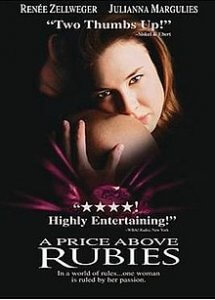 9. A Price Above Rubies (1998), is British-American drama film written and directed by Boaz Yakin and starring Renée Zellweger. The story centers on a young woman who finds it difficult to conform to the restrictions imposed on her by her community. Reviews of the movie were mixed, though generally positive to Zellweger’s performance.
9. A Price Above Rubies (1998), is British-American drama film written and directed by Boaz Yakin and starring Renée Zellweger. The story centers on a young woman who finds it difficult to conform to the restrictions imposed on her by her community. Reviews of the movie were mixed, though generally positive to Zellweger’s performance.
The title comes from a biblical quote: Proverbs 31:10, in the King James translation, says “Who can find a virtuous woman? For her price is far above rubies”.
The film tells the story of Sonia (Zellweger), a young Brooklyn woman who has just given birth to her first child. She is married, through an arranged marriage, to Mendel (Glenn Fitzgerald), a devout Hasidic Jew who is too immersed in his studies to give his wife the attention she craves. As a result, Sonia develops a relationship with Mendel’s brother, the jeweler Sender (Eccleston), who brings her into the business. Sender is the only release for Sonia’s repressed sexuality, and he takes full advantage of that fact as often as he can, but she is repelled by his utter lack of morals as she finds balance between what she feels and what she has been taught is “sinful”. The jewellery business brings her into close contact with the young Puerto Rican artist and jewellery designer Ramon (Payne), but when Sender finds out about their connection he reveals it to the family, and Sonia is divorced and ostracized. The film ends on a more tolerance-friendly note, with Sonia balancing desire and every day life, and Mendel accepting her differences with a blessing and the promise to restore custody of their son.
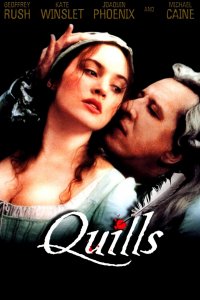 10. Quills (2000), A fictional work that reconstructs the unknown fate of the Marquis de Sade, the writer and sexual deviant who was imprisoned in an insane asylum for the last 10 years of his life. The Marquis de Sade befriends the director of the asylum and shares affections with the asylum laundress. When a doctor is sent in to cure the Marquis of his supposed madness, the Marquis’s rebellious character only grows stronger.
10. Quills (2000), A fictional work that reconstructs the unknown fate of the Marquis de Sade, the writer and sexual deviant who was imprisoned in an insane asylum for the last 10 years of his life. The Marquis de Sade befriends the director of the asylum and shares affections with the asylum laundress. When a doctor is sent in to cure the Marquis of his supposed madness, the Marquis’s rebellious character only grows stronger.
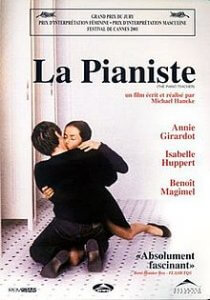 11. Piano Teacher (French: La Pianiste, lit. ‘The Pianist’) (2001), French-language psychological thriller film, written and directed by Michael Haneke, that is based on the 1983 novel of the same name by Elfriede Jelinek. It tells the story of an unmarried piano teacher at a Vienna conservatory, living with her mother in a state of emotional and sexual disequilibrium, who enters into a sadomasochistic relationship with her student. A co-production of Austria and France, Haneke was given the opportunity to direct after previous attempts to adapt the novel by filmmakers Valie Export and Paulus Manker collapsed for financial reasons.
11. Piano Teacher (French: La Pianiste, lit. ‘The Pianist’) (2001), French-language psychological thriller film, written and directed by Michael Haneke, that is based on the 1983 novel of the same name by Elfriede Jelinek. It tells the story of an unmarried piano teacher at a Vienna conservatory, living with her mother in a state of emotional and sexual disequilibrium, who enters into a sadomasochistic relationship with her student. A co-production of Austria and France, Haneke was given the opportunity to direct after previous attempts to adapt the novel by filmmakers Valie Export and Paulus Manker collapsed for financial reasons.
At the 2001 Cannes Film Festival it won the Grand Prix, with the two leads, Isabelle Huppert and Benoît Magimel, winning Best Actress and Best Actor. It went on to receive positive reviews and other awards and nominations.
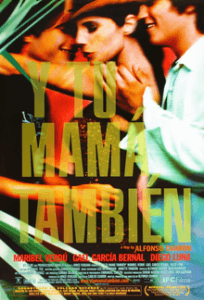 12. Y Tu Mamá También (English: And Your Mother Too) (2001), Mexican drama film directed by Alfonso Cuarón and co-written by Cuarón and his brother Carlos.
12. Y Tu Mamá También (English: And Your Mother Too) (2001), Mexican drama film directed by Alfonso Cuarón and co-written by Cuarón and his brother Carlos.
The film tells a coming-of-age story about two teenage boys who take a road trip with a woman in her late twenties. It stars Mexican actors Diego Luna and Gael García Bernal and Spanish actress Maribel Verdú, in the leading roles. The film is part of the road movie genre, set in 1999 against the backdrop of the political and economic realities of present-day Mexico, specifically at the end of the uninterrupted 71-year line of Mexican presidents from the Institutional Revolutionary Party and the rise of the opposition led by Vicente Fox.
The film is recognized for its explicit depiction of sex and drug use, which caused complications in the film’s rating certificate in various countries. In 2002, the film was released in English-speaking markets under its original Spanish title and opened in limited release within the United States. In Mexico, the film earned $2.2 million its first weekend in June 2001, making it the highest box office opening in Mexican cinema history. In 2003, the film was nominated for Best Original Screenplay at the Academy Awards as well as Best Foreign Language Film at the Golden Globe Awards in 2002.
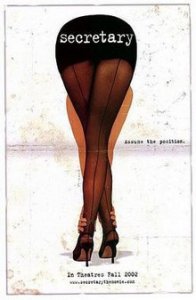 14. Secretary (2002), is American romantic comedy-drama film directed by Steven Shainberg and written by Erin Cressida Wilson, based on the short story Secretary by Mary Gaitskill. Starring Maggie Gyllenhaal and James Spader, the film explores the relationship between a dominant lawyer and his submissive secretary.
14. Secretary (2002), is American romantic comedy-drama film directed by Steven Shainberg and written by Erin Cressida Wilson, based on the short story Secretary by Mary Gaitskill. Starring Maggie Gyllenhaal and James Spader, the film explores the relationship between a dominant lawyer and his submissive secretary.
Lee Holloway (Maggie Gyllenhaal), a young woman with a history of severe emotional problems, is released into the care of her overbearing parents following a stay at a mental institution. She finds work as a secretary for a rigid and demanding attorney, E. Edward Grey (James Spader), and starts dating the kind but dull Peter (Jeremy Davies). However, Lee soon realizes she’s turned on by Grey’s stern demeanor, and begins a sadomasochistic relationship with him.
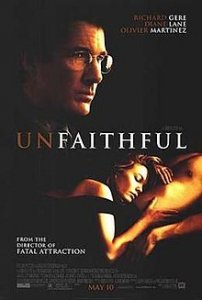 15. Unfaithful (2002), American thriller drama film directed by Adrian Lyne and starring Richard Gere, Diane Lane, Olivier Martinez, Erik Per Sullivan, Chad Lowe and Dominic Chianese. It was adapted by Alvin Sargent and William Broyles Jr. from the 1969 French film The Unfaithful Wife (La Femme infidèle) by the noted director Claude Chabrol. It tells about a couple living in suburban New York City whose marriage goes dangerously awry when the wife indulges in an adulterous affair with a stranger she encounters by chance.
15. Unfaithful (2002), American thriller drama film directed by Adrian Lyne and starring Richard Gere, Diane Lane, Olivier Martinez, Erik Per Sullivan, Chad Lowe and Dominic Chianese. It was adapted by Alvin Sargent and William Broyles Jr. from the 1969 French film The Unfaithful Wife (La Femme infidèle) by the noted director Claude Chabrol. It tells about a couple living in suburban New York City whose marriage goes dangerously awry when the wife indulges in an adulterous affair with a stranger she encounters by chance.
Described by director Adrian Lyne (“Fatal Attraction”) as “an erotic thriller about the body language of guilt.” When Edward (Richard Gere) innocently learns that his wife Connie (Diane Lane) has lied to him about an affair, suspicion propels him to uncover the devastating details of her infidelity. Tormented by the knowledge, he confronts her lover, only to discover a level of rage within himself that he could never have imagined.
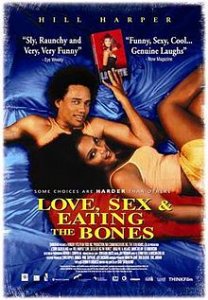 16. Love, Sex, and Eating the Bones (2003). Canadian romantic comedy film directed and screenwriter|written by Sudz Sutherlandfeaturing a mostly African American and Black Canadian leading cast. It premiered and played twice at the 2003 Toronto International Film Festival, where it won the award for Best Canadian First Feature Film.
16. Love, Sex, and Eating the Bones (2003). Canadian romantic comedy film directed and screenwriter|written by Sudz Sutherlandfeaturing a mostly African American and Black Canadian leading cast. It premiered and played twice at the 2003 Toronto International Film Festival, where it won the award for Best Canadian First Feature Film.
A security guard’s obsession with pornography affects his sexual performance with a young woman.
Canadian writer/director Sudz Sutherland makes his feature debut with the romantic comedy Love, Sex & Eating the Bones. Hill Harper plays Michael, a Toronto security guard who wants to be a photographer. He spends most of his time at an adult movie store called Pornocopia, renting videos starring Lisette (Marieka Weathered). One day in a laundromat, he meets young urban professional Jasmine (Marlyne N. Afflack), who has been celibate for some time. After a few dates, Michael finds out that his little porn habit has caused him to fear actual sex with another person. Love, Sex & Eating the Bones was shown at the 2003 Toronto Film Festival.
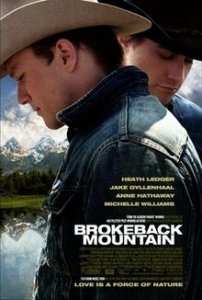 17. Brokeback Mountain (2005), American neo-Western romantic drama film directed by Ang Lee and produced by Diana Ossana and James Schamus. Adapted from the 1997 short story of the same name by Annie Proulx, the screenplay was written by Ossana and Larry McMurtry. The film stars Heath Ledger, Jake Gyllenhaal, Anne Hathaway, and Michelle Williams, and depicts the complex emotional and sexual relationship between Ennis Del Mar and Jack Twist in the American West from 1963 to 1983.
17. Brokeback Mountain (2005), American neo-Western romantic drama film directed by Ang Lee and produced by Diana Ossana and James Schamus. Adapted from the 1997 short story of the same name by Annie Proulx, the screenplay was written by Ossana and Larry McMurtry. The film stars Heath Ledger, Jake Gyllenhaal, Anne Hathaway, and Michelle Williams, and depicts the complex emotional and sexual relationship between Ennis Del Mar and Jack Twist in the American West from 1963 to 1983.
In 1963, rodeo cowboy Jack Twist (Jake Gyllenhaal) and ranch hand Ennis Del Mar (Heath Ledger) are hired by rancher Joe Aguirre (Randy Quaid) as sheep herders in Wyoming. One night on Brokeback Mountain, Jack makes a drunken pass at Ennis that is eventually reciprocated. Though Ennis marries his longtime sweetheart, Alma (Michelle Williams), and Jack marries a fellow rodeo rider (Anne Hathaway), the two men keep up their tortured and sporadic affair over the course of 20 years.
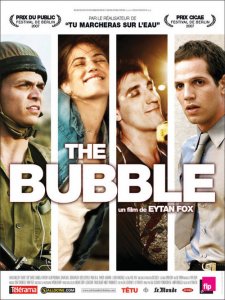 18. The Bubble (2006), Lulu lives with two gay guys, brooding music lover Noam and flamboyant cafe owner Yali. The roommates’ days and nights are spent in typical slacker fashion–hanging out, watching TV, getting laid. They are secular and progressive, but not overly political. Everything changes when Noam meets Ashraf, a cute and intense Palestinian guy, at a checkpoint. Noam is on reserve duty and Ashraf is helping a woman forced to give birth at the roadside–not the best circumstances for a meeting, but something connects them. When Ashraf shows up at Noam’s apartment, a powerfully erotic love affair begins. Ashraf becomes part of their group, while Lulu and Yali also fall dramatically in and out of love. One almost believes that the two men could inspire change as symbols of peace, but their affair is already doomed. The awful violence of life outside the bubble envelops them, gradually making their affair one of painful, tragic irony.
18. The Bubble (2006), Lulu lives with two gay guys, brooding music lover Noam and flamboyant cafe owner Yali. The roommates’ days and nights are spent in typical slacker fashion–hanging out, watching TV, getting laid. They are secular and progressive, but not overly political. Everything changes when Noam meets Ashraf, a cute and intense Palestinian guy, at a checkpoint. Noam is on reserve duty and Ashraf is helping a woman forced to give birth at the roadside–not the best circumstances for a meeting, but something connects them. When Ashraf shows up at Noam’s apartment, a powerfully erotic love affair begins. Ashraf becomes part of their group, while Lulu and Yali also fall dramatically in and out of love. One almost believes that the two men could inspire change as symbols of peace, but their affair is already doomed. The awful violence of life outside the bubble envelops them, gradually making their affair one of painful, tragic irony.
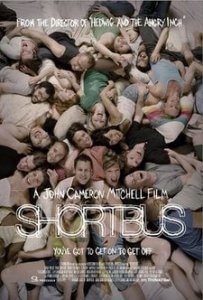 19. Shortbus (2006), is American erotic comedy-drama film written and directed by John Cameron Mitchell. The plot revolves around a sexually diverse ensemble of colorful characters trying desperately to connect in New York City. The characters converge in a weekly Brooklyn artistic/sexual salon loosely inspired by various underground NYC gatherings that took place in the early 2000s. According to Mitchell, the film attempts to “employ sex in new cinematic ways because it’s too interesting to leave to porn.” Shortbus includes a variety of explicit scenes containing non-simulated sexual intercourse with visible penetration and male ejaculation.
19. Shortbus (2006), is American erotic comedy-drama film written and directed by John Cameron Mitchell. The plot revolves around a sexually diverse ensemble of colorful characters trying desperately to connect in New York City. The characters converge in a weekly Brooklyn artistic/sexual salon loosely inspired by various underground NYC gatherings that took place in the early 2000s. According to Mitchell, the film attempts to “employ sex in new cinematic ways because it’s too interesting to leave to porn.” Shortbus includes a variety of explicit scenes containing non-simulated sexual intercourse with visible penetration and male ejaculation.
Sofia (Sook-Yin Lee) is a couples therapist who is unable to climax despite the ministrations of her loving husband. Gay couple James (Paul Dawson) and Jamie (PJ DeBoy) decide to open the doors of their relationship by inviting in a third partner. All three attend a mixer in which partygoers partake of a sexual banquet.
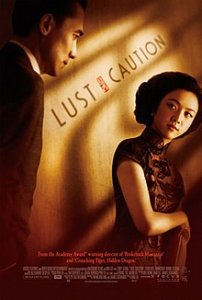 20. Lust, Caution (2007), Lust, Caution (Chinese: 色,戒; pinyin: Sè, Jiè; Jyutping: Sik1Gaai3) is a erotic espionage period thriller film directed by Ang Lee, based on the novella of the same name published in 1979 by Chinese author Eileen Chang. The story is mostly set in Hong Kong in 1938 and in Shanghai in 1942, when it was occupied by the Imperial Japanese Army and ruled by the puppet government led by Wang Jingwei. It depicts a group of Chinese university students from the Lingnan University who plot to assassinate a high-ranking special agent and recruiter working for the puppet government, by using one of their group, an attractive young woman, to lure him into a honey trap. The film is generally accepted to be based on the historical event of Chinese spy Zheng Pingru’s failed attempt to assassinate the Japanese collaborator Ding Mocun.
20. Lust, Caution (2007), Lust, Caution (Chinese: 色,戒; pinyin: Sè, Jiè; Jyutping: Sik1Gaai3) is a erotic espionage period thriller film directed by Ang Lee, based on the novella of the same name published in 1979 by Chinese author Eileen Chang. The story is mostly set in Hong Kong in 1938 and in Shanghai in 1942, when it was occupied by the Imperial Japanese Army and ruled by the puppet government led by Wang Jingwei. It depicts a group of Chinese university students from the Lingnan University who plot to assassinate a high-ranking special agent and recruiter working for the puppet government, by using one of their group, an attractive young woman, to lure him into a honey trap. The film is generally accepted to be based on the historical event of Chinese spy Zheng Pingru’s failed attempt to assassinate the Japanese collaborator Ding Mocun.
During World War II a secret agent (Tang Wei) must seduce, then assassinate an official (Tony Leung Chiu Wai) who works for the Japanese puppet government in Shanghai. Her mission becomes clouded when she finds herself falling in love with the man she is assigned to kill.
With this film, Lee won the Golden Lion Award at the Venice Film Festival for the second time, the first being with Brokeback Mountain. The film adaptation and the story are loosely based on events that took place during the Japanese occupation of Shanghai. The film’s explicit sex scenes resulted in the film being rated NC-17 in the United States.
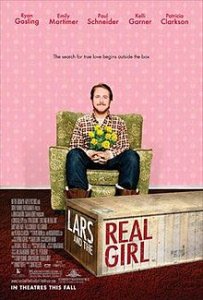 21. Lars and the Real Girl (2007). Comedy-drama film written by Nancy Oliver and directed by Craig Gillespie. It stars Ryan Gosling, Emily Mortimer, Paul Schneider, Kelli Garner, and Patricia Clarkson. The film follows Lars (Gosling), a sweet but socially awkward young man who develops a romantic yet platonic relationship with an anatomically correct sex doll, a “RealDoll” named Bianca.
21. Lars and the Real Girl (2007). Comedy-drama film written by Nancy Oliver and directed by Craig Gillespie. It stars Ryan Gosling, Emily Mortimer, Paul Schneider, Kelli Garner, and Patricia Clarkson. The film follows Lars (Gosling), a sweet but socially awkward young man who develops a romantic yet platonic relationship with an anatomically correct sex doll, a “RealDoll” named Bianca.
How do you make a film about a life-sized love doll, ordered through the Internet, into a life-affirming statement of hope? In “Lars and the Real Girl,” you do it with faith in human nature, and with a performance by Ryan Gosling that says things that cannot be said. And you surround him with actors who express the instinctive kindness we show to those we love.
Gosling, who has played neo-Nazis and district attorneys, now plays Lars Lindstrom, a painfully shy young man who can barely stand the touch of another human being. He functions in the world and has an office job, but in the evening, he sits alone in a cabin in the back yard of his family home. His mother died years ago, his depressive father more recently. Now the big house is occupied by his brother Gus (Paul Schneider) and pregnant sister-in-law Karin (Emily Mortimer). She makes it her business to invite him to dinner, to share their lives, but he begs off with one lame excuse after another, and sits alone in the dark.
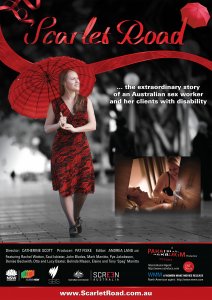 22. Scarlet Road (2011), a documentary follows the extraordinary work of Australian sex worker, Rachel Wotton. Impassioned about freedom of sexual expression and the rights of sex workers, she specializes in a long over-looked clientèle – people with disability.
22. Scarlet Road (2011), a documentary follows the extraordinary work of Australian sex worker, Rachel Wotton. Impassioned about freedom of sexual expression and the rights of sex workers, she specializes in a long over-looked clientèle – people with disability.
30- something Australian sex worker Rachel Wotton, a composed and good-natured self-deemed “whore” who has spent a great deal of time establishing long-term physical relationships with several disabled men. Rachel maintains that these members of our communities have just as much right to sex as anyone, but are unfortunately given fewer opportunities to get it.
As her clientele expanded over the years, Rachel realized that this was a bona fide social concern, and set out to educate the public – as well as other sex workers – that there’s no reason to exclude the disabled from our bedrooms. We learn that she’s founded an organization called Touching Base, which aims to bring this unspoken concern to international awareness as well as provide options for those who haven’t easily found intimacy due to their physical hurdles. It’s a bold, unprecedented cause to champion, but Rachel’s tireless tenacity shows that the task is certainly not insurmountable.
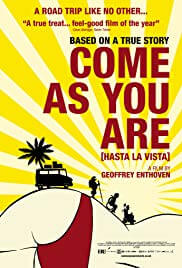 23. Come as You Are (2011), Three guys in their twenties love wine and women but they are still virgins. Under the guise of a wine tour they embark on a journey to Spain hoping to have their first sexual experience. Jozef is blind, Philip is paralyzed from the neck down and Lars is in a wheelchair with a brain tumor, but they’re not going to let anything stand in their way…
23. Come as You Are (2011), Three guys in their twenties love wine and women but they are still virgins. Under the guise of a wine tour they embark on a journey to Spain hoping to have their first sexual experience. Jozef is blind, Philip is paralyzed from the neck down and Lars is in a wheelchair with a brain tumor, but they’re not going to let anything stand in their way…
Wheelchair-bound Lars and Philip and their blind mate Jozef, all in their twenties, desperately long for a coming of age journey and the end of virginity. Finally they can convince their parents to let them drive trough France to Spain in a specially equipped minibus, chaperoned by experienced nurse Theo, omitting their Spanish destination is near an accommodating brothel. Lars gets a diagnosis spelling early death and Theo cancels, but Lars convinces his mates to go anyway, the bus being driven by Theo’s francophone friend, obese Claude. Nothing goes to plan, yet satisfaction is found until the bitter end.
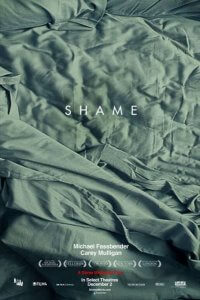 24. Shame (2011), is a British drama film directed and co-written by Steve McQueen, starring Michael Fassbender and Carey Mulligan as grown siblings. It was co-produced by Film4 and See-Saw Films. The film’s explicit scenes reflecting the protagonist’s sexual addiction resulted in a rating of NC-17 in the United States. Shame was released in the United Kingdom on 13 January 2012.
24. Shame (2011), is a British drama film directed and co-written by Steve McQueen, starring Michael Fassbender and Carey Mulligan as grown siblings. It was co-produced by Film4 and See-Saw Films. The film’s explicit scenes reflecting the protagonist’s sexual addiction resulted in a rating of NC-17 in the United States. Shame was released in the United Kingdom on 13 January 2012.
Brandon Sullivan is an Irish-American New York City executive and long-term bachelor. He is a sex addict who frequently has sex with prostitutes and masturbates several times daily, sometimes viewing pornography on his work computers. One day Brandon makes eye contact with a woman wearing an engagement ring on the subway during his morning commute. She initially reciprocates, but becomes uncomfortable. When they exit, she disappears into the crowd. He masturbates in the bathroom afterwards at work. Brandon and his married boss, David, hit on women at a club; later, Brandon has sex on a quiet street with Elizabeth, the woman David was pursuing.
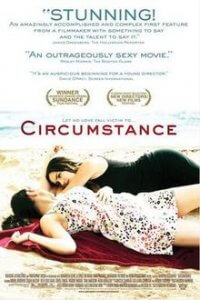 25. Circumstance (2011), (Persian: شرایط Šar’ayet) (French: En secret) is a French-Iranian-American dramatic film written and directed by Maryam Keshavarz starring Nikohl Boosheri, Sarah Kazemy, and Reza Sixo Safai. It explores homosexuality in modern Iran, among other subjects.
25. Circumstance (2011), (Persian: شرایط Šar’ayet) (French: En secret) is a French-Iranian-American dramatic film written and directed by Maryam Keshavarz starring Nikohl Boosheri, Sarah Kazemy, and Reza Sixo Safai. It explores homosexuality in modern Iran, among other subjects.
Atafeh (Nikohl Boosheri) is the teenage daughter of a wealthy Iranian family in Tehran. She and her best friend, the orphaned Shireen (Sarah Kazemy) attend illicit parties and experiment with sex, drinking, and drugs.
Atafeh’s brother Mehran (Reza Sixo Safai) is a recovering drug addict who becomes increasingly religious and obsessed with Shireen, coinciding with the collapse of his once-strong relationship with his sister.
The heads of the family are the Hakimi parents, Firouz and Azar, who reminisce on their youth and what has become and what will become of their family.
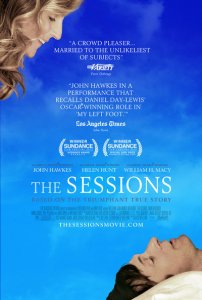 26. The Sessions (2012), film Though a childhood bout with polio left him dependent on an iron lung, Mark O’Brien maintains a career as a journalist and poet. A writing assignment dealing with sex and the disabled piques Mark’s curiosity, and he decides to investigate the possibility of experiencing sex himself. When his overtures toward a caregiver scare her away, he books an appointment with sex surrogate Cheryl Cohen Green (Helen Hunt) to lose his virginity.
26. The Sessions (2012), film Though a childhood bout with polio left him dependent on an iron lung, Mark O’Brien maintains a career as a journalist and poet. A writing assignment dealing with sex and the disabled piques Mark’s curiosity, and he decides to investigate the possibility of experiencing sex himself. When his overtures toward a caregiver scare her away, he books an appointment with sex surrogate Cheryl Cohen Green (Helen Hunt) to lose his virginity.
This funny, moving, beautifully acted movie avoids numerous pitfalls. It’s neither clinical nor triumphalist. It’s honest about desire and love and the need for sex, though perhaps somewhat judgmental about prostitutes when Mark comes to making rigid distinctions between the benefits of their services and those of a surrogate like Cheryl. The film is based on a magazine article by Mark called “On Seeing a Sex Surrogate” and on interviews with Cheryl and with Susan Fernbach, the hospital volunteer who became his companion, lover and literary collaborator for the rest of his life.
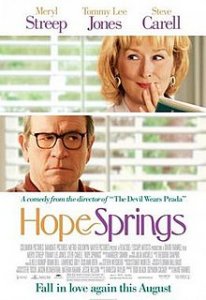 27. Hope Springs (2012), American romantic comedy-drama directed by David Frankel, written by Vanessa Taylor and starring Meryl Streep, Tommy Lee Jones, and Steve Carell. The film was released on August 8, 2012. It received generally positive reviews, and the cast was praised for their performances. It was nominated for a Golden Globe and won a People’s Choice Award.
27. Hope Springs (2012), American romantic comedy-drama directed by David Frankel, written by Vanessa Taylor and starring Meryl Streep, Tommy Lee Jones, and Steve Carell. The film was released on August 8, 2012. It received generally positive reviews, and the cast was praised for their performances. It was nominated for a Golden Globe and won a People’s Choice Award.
Long-married couple Kay (Meryl Streep) and Arnold (Tommy Lee Jones) love each other, but after so many years together, Kay feels the need to spice things up and reconnect with her husband. Hearing of a renowned marriage counselor (Steve Carell) in the town of Great Hope Springs, Kay manages to persuade her stubborn mate to attend a retreat with her. As they shed their bedroom hang-ups, Kay and Arnold find that the real challenge is reigniting the spark that originally brought them together.
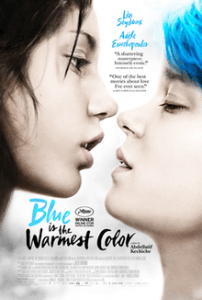 28. Blue Is The Warmest Color (2013), Blue Is the Warmest Colour (French: La Vie d’Adèle – Chapitres 1 & 2; French pronunciation: [la vi da’dɛːl]), is a French coming-of-age erotic romantic drama film co-written, co-produced, and directed by Abdellatif Kechiche, and starring Léa Seydoux and Adèle Exarchopoulos. The film revolves around Adèle (Exarchopoulos), a French teenager who discovers desire and freedom when a blue-haired aspiring painter (Seydoux) enters her life. The film charts their relationship from Adele’s high school years to her early adult life and career as a school teacher. The premise of Blue Is the Warmest Colour is based on the 2010 French graphic novel of the same name by Julie Maroh,[6] which was published in North America in 2013.
28. Blue Is The Warmest Color (2013), Blue Is the Warmest Colour (French: La Vie d’Adèle – Chapitres 1 & 2; French pronunciation: [la vi da’dɛːl]), is a French coming-of-age erotic romantic drama film co-written, co-produced, and directed by Abdellatif Kechiche, and starring Léa Seydoux and Adèle Exarchopoulos. The film revolves around Adèle (Exarchopoulos), a French teenager who discovers desire and freedom when a blue-haired aspiring painter (Seydoux) enters her life. The film charts their relationship from Adele’s high school years to her early adult life and career as a school teacher. The premise of Blue Is the Warmest Colour is based on the 2010 French graphic novel of the same name by Julie Maroh,[6] which was published in North America in 2013.
Production began in March 2012 and lasted six months. Approximately 800 hours of footage was shot, including extensive B-roll footage, with Kechiche ultimately trimming the final cut of the film down to 179 minutes. The film generated controversy upon its premiere at the 2013 Cannes Film Festival and before its release. Much of the controversy was centered on claims of poor working conditions on set by the crew and the lead actresses, and also the film’s raw depiction of sexuality.
At the 2013 Cannes Film Festival the film unanimously won the Palme d’Or from the official jury and the FIPRESCI Prize. It is the first film to have the Palme d’Or awarded to both the director and the lead actresses, with Seydoux and Exarchopoulos joining Jane Campion (The Piano) as the only women to have won the award. The film had its North American premiere at the 2013 Telluride Film Festival. The film received critical acclaim and was nominated for the Golden Globe Award for Best Foreign Language Film and the BAFTA Award for Best Film Not in the English Language.[15] Many critics declared it one of the best films of 2013.
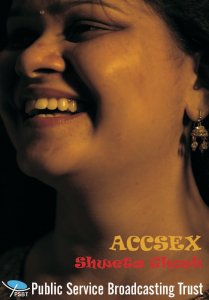 29. ACCSEX (2013) is film directed by Shweta Ghosh that explores notions of beauty, the “ideal body” and sexuality through four storytellers; four women who happen to be persons with disability.
29. ACCSEX (2013) is film directed by Shweta Ghosh that explores notions of beauty, the “ideal body” and sexuality through four storytellers; four women who happen to be persons with disability.
Beautiful. Ugly. Complete. Incomplete. Able. Disabled.Within stifling dichotomies of normal and abnormal, lie millions of women negotiating with their identities. This film explores notions of beauty, the ‘ideal body’ and sexuality through four storytellers; four women who happen to be persons with disability.Through the lives of Natasha, Sonali, Kanti and Abha, this film foregrounds questions of acceptance, confidence and resistance to the normative. As it turns out, these questions are not too removed from everyday realities of several others, deemed ‘imperfect’ and ‘monstrous’ for not fitting in. Accsex traces the journey of the storytellers as they reclaim agency and the right to unapologetic confidence, sexual expression and happiness.
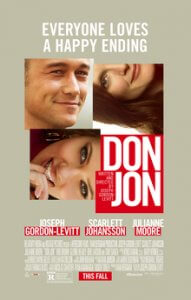 30. Don Jon (2013), is American romantic comedy-drama film written and directed by Joseph Gordon-Levitt. Produced by Ram Bergman and Nicolas Chartier, the film stars Gordon-Levitt, Scarlett Johansson, and Julianne Moore, with Rob Brown, Glenne Headly, Brie Larson, and Tony Danza in supporting roles. The film premiered at the Sundance Film Festival on January 18, 2013, and had its wide release in the United States on September 27, 2013.
30. Don Jon (2013), is American romantic comedy-drama film written and directed by Joseph Gordon-Levitt. Produced by Ram Bergman and Nicolas Chartier, the film stars Gordon-Levitt, Scarlett Johansson, and Julianne Moore, with Rob Brown, Glenne Headly, Brie Larson, and Tony Danza in supporting roles. The film premiered at the Sundance Film Festival on January 18, 2013, and had its wide release in the United States on September 27, 2013.
New Jersey bartender Jon Martello (Joseph Gordon-Levitt) knows what’s important: his friends, his family, his car, his church, his sexual conquests — and porn. In fact, Jon is a porn addict and has never had a genuine relationship with a woman. However, when he meets Barbara (Scarlett Johansson) he has to change his operating methods, because Barbara won’t be bedded easily. For the first time in his life, Jon begins a real courtship, but his obsession with erotica threatens to ruin everything.
and directed by Josh Lawson. It deals with the secret lives of five suburban couples living in Sydney revealing both the fetishes and the repercussions that come with sharing them. It has a Spanish adaptation in the 2016 remake film Kiki, Love to Love.
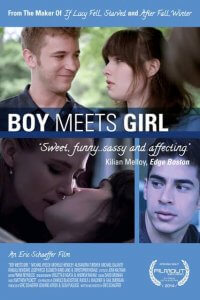 31. Boy Meets Girl (2014), Boy Meets Girl is a American romantic comedy-drama directed by Eric Schaeffer 21-year old Ricky is a transgender woman living in a small town in Kentucky with big dreams to move to New York and attend a school of fashion design. Ricky is working as a barista and spends most of her time hanging out with her only friend Robby who has been by her side for the past 15 years. One day while Ricky is at work, a woman from town named Francesca walks in, a friendship unexpectedly blossoms, which then turns into an affair.
31. Boy Meets Girl (2014), Boy Meets Girl is a American romantic comedy-drama directed by Eric Schaeffer 21-year old Ricky is a transgender woman living in a small town in Kentucky with big dreams to move to New York and attend a school of fashion design. Ricky is working as a barista and spends most of her time hanging out with her only friend Robby who has been by her side for the past 15 years. One day while Ricky is at work, a woman from town named Francesca walks in, a friendship unexpectedly blossoms, which then turns into an affair.
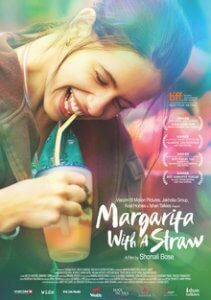 32. Margarita with a Straw (2014), a film featuring a rebellious young woman with cerebral palsy, leaving her home in India to study in New York, who unexpectedly falls in love and embarks on an exhilarating journey of self-discovery.
32. Margarita with a Straw (2014), a film featuring a rebellious young woman with cerebral palsy, leaving her home in India to study in New York, who unexpectedly falls in love and embarks on an exhilarating journey of self-discovery.
Well-intentioned Indian film that arrives at the London film festival trailing a number of awards, as well as something of a reputation for having ruffled feathers back home. Margarita, With a Straw is a sturdily conceived, emotionally direct drama about a student grappling with cerebral palsy and bisexuality; the title refers to her first time ordering an alcoholic drink, after she has made her way from Delhi to New York University.
Writer-director Shonali Bose has taken on two big subjects: her film focuses on Laila, who does her damnedest not to let her cerebral palsy get in the way of the student lifestyle – she write lyrics for a rock band, surfs dodgy sites on the internet, and languors after hunky long-haired boys. Inevitably, more than her share of disappointment comes her way and, reeling from one particular embarrassment, she takes up an offer of a place on a creative writing programme at NYU. There, in more liberal climes, she encounters (blind) firebrand activist Khanum (Sayani Gupta), with whom she embarks on a tremulous same-sex affair.
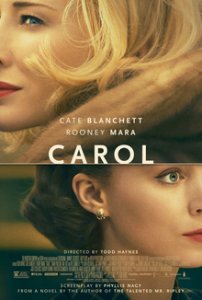 33. Carol (2015). Drama film directed by Todd Haynes. The screenplay, written by Phyllis Nagy, is based on the 1952 romance novel The Price of Salt by Patricia Highsmith (republished as Carol in 1990). The film stars Cate Blanchett, Rooney Mara, Sarah Paulson, Jake Lacy, and Kyle Chandler. Set in New York City during the early 1950s, Carol tells the story of a forbidden affair between an aspiring female photographer and an older woman going through a difficult divorce.
33. Carol (2015). Drama film directed by Todd Haynes. The screenplay, written by Phyllis Nagy, is based on the 1952 romance novel The Price of Salt by Patricia Highsmith (republished as Carol in 1990). The film stars Cate Blanchett, Rooney Mara, Sarah Paulson, Jake Lacy, and Kyle Chandler. Set in New York City during the early 1950s, Carol tells the story of a forbidden affair between an aspiring female photographer and an older woman going through a difficult divorce.
Therese Belivet (Rooney Mara) spots the beautiful, elegant Carol (Cate Blanchett) perusing the doll displays in a 1950s Manhattan department store. The two women develop a fast bond that becomes a love with complicated consequences.
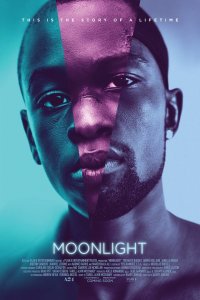 34. Moonlight (2016). American coming-of-age drama film written and directed by Barry Jenkins, based on Tarell Alvin McCraney’s unpublished semi-autobiographical play In Moonlight Black Boys Look Blue. It stars Trevante Rhodes, André Holland, Janelle Monáe, Ashton Sanders, Jharrel Jerome, Naomie Harris, and Mahershala Ali.
34. Moonlight (2016). American coming-of-age drama film written and directed by Barry Jenkins, based on Tarell Alvin McCraney’s unpublished semi-autobiographical play In Moonlight Black Boys Look Blue. It stars Trevante Rhodes, André Holland, Janelle Monáe, Ashton Sanders, Jharrel Jerome, Naomie Harris, and Mahershala Ali.
The film presents three stages in the life of the main character; his youth, adolescence, and early adult life. It explores the difficulties he faces with his sexuality and identity, including the physical and emotional abuse he endures growing up. Filmed in Miami, Florida, beginning in 2015, Moonlight premiered at the Telluride Film Festival on September 2, 2016. Distributed by A24, the film was released in the United States on October 21, 2016, and grossed over $65 million worldwide.
At the 74th Golden Globe Awards Moonlight won Best Motion Picture – Drama and was nominated in five other categories. The film won the Academy Award for Best Picture, along with Best Supporting Actor for Ali and Best Adapted Screenplay for Jenkins and McCraney, from a total of eight nominations. In 2017, The New York Times considered it the 20th “Best Film of the 21st Century So Far”
Moonlight became the first film with an all-black cast, the first LGBTQ film, and the second lowest-grossing film domestically (behind The Hurt Locker) to win the Oscar for Best Picture. The film’s editor, Joi McMillon, became the first black woman to be nominated for an editing Oscar (alongside co-editor Nat Sanders), and Ali became the first Muslim to win an acting Oscar.
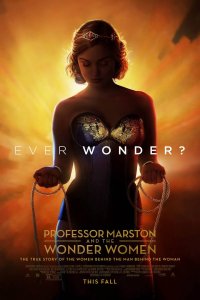 35. Professor Marston & the Wonder Women (2017), The story is told in flashbacks set during a 1945 testimony that William Moulton Marston gives to representatives of the Child Study Association of America. In the year 1928, William and his wife Elizabeth teach and work on their research at the associated Harvard and Radcliffe Colleges. One day, William hires one of his students, Olive Byrne (daughter of Ethel Byrne and niece of Margaret Sanger – two famous suffragists and feminists of the 20th century) as a research assistant. Olive aids in the Marstons’ work in inventing the lie detector and conducting research on William’s DISC theory on human interactions, and the three soon grow close. One after another tests by the lie detector reveal that they have fallen in love with one another, and all three of them begin to engage in a polyamorous relationship.
35. Professor Marston & the Wonder Women (2017), The story is told in flashbacks set during a 1945 testimony that William Moulton Marston gives to representatives of the Child Study Association of America. In the year 1928, William and his wife Elizabeth teach and work on their research at the associated Harvard and Radcliffe Colleges. One day, William hires one of his students, Olive Byrne (daughter of Ethel Byrne and niece of Margaret Sanger – two famous suffragists and feminists of the 20th century) as a research assistant. Olive aids in the Marstons’ work in inventing the lie detector and conducting research on William’s DISC theory on human interactions, and the three soon grow close. One after another tests by the lie detector reveal that they have fallen in love with one another, and all three of them begin to engage in a polyamorous relationship.
As words about their unconventional relationship gets out, the Marstons are fired from the university. Olive reveals that she is pregnant and moves in with the Marstons shortly after. The trio decide to build a family together and create a fabrication to keep secret the nature of their relationship. The family settle in a New York suburb, happily together. By 1934, both Elizabeth and Olive bear children by William (Olive has two sons and Elizabeth has one son and a daughter), telling the neighbors that Olive is a widow and taken in by the Marstons. William starts trying to make a living as an author. Elizabeth takes a job as a secretary and becomes the main breadwinner of the family. Olive stays at home and takes care of the kids, occasionally submitting her writing samples to publishers. They raise their four children together, and Elizabeth names her daughter after Olive.
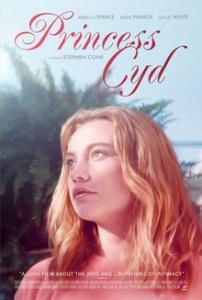 36. Princess Cyd (2017) Drama film written and directed by Stephen Cone and starring Rebecca Spence, Jessie Pinnick, and Malic White.
36. Princess Cyd (2017) Drama film written and directed by Stephen Cone and starring Rebecca Spence, Jessie Pinnick, and Malic White.
Principal photography for Princess Cyd took place in Chicago from August 31 to September 25, 2016. Cone had originally conceived the story as taking place in his childhood home of South Carolina, as with his 2011 breakout film The Wise Kids. Cone later decided to shift the story to Chicago, however, recalling, “…I was walking down Sunnyside Avenue one day, towards my friend’s house at Damen and Sunnyside, and I love the houses along the way there, and suddenly the story just kind of shifted in my head.” He added, “I thought, very easily one of these houses could be inhabited by a well-regarded Chicago author, and maybe this is a summer tale set in Chicago. So suddenly this female-led excursion into Chicago became a love letter to women, a love letter to Chicago, a love letter to queerness.”
What do you think of this list? Should I add any more titles to it? Let me know!
Sex toys and movies have become increasingly popular in recent years, as people explore their sexuality in new and exciting ways. From vibrating pleasures and dildos to bondage gear and role-play costumes, there is a wide variety of sex toys available for people to enjoy. Similarly, adult movies have become more mainstream, allowing people to explore their fantasies in a safe and consensual way. Whether you’re looking for a new way to spice up your sex life or just curious about what’s out there, sex toys and movies offer a great way to explore your sexuality.
About Dr. Martha Tara Lee
 Surrounded by friends who were sexually inhibited and struck by dire lack of positive conversations around sex and sexuality in Singapore, Dr. Martha Tara Lee set out to make a positive difference in embarking on her doctorate in human sexuality before launching Eros Coaching in 2009. Today, she remains dedicated to working with individuals and couples who wish to lead self-actualised and pleasure-filled lives.
Surrounded by friends who were sexually inhibited and struck by dire lack of positive conversations around sex and sexuality in Singapore, Dr. Martha Tara Lee set out to make a positive difference in embarking on her doctorate in human sexuality before launching Eros Coaching in 2009. Today, she remains dedicated to working with individuals and couples who wish to lead self-actualised and pleasure-filled lives.
She also holds certificates in counselling, coaching and sex therapy, and her fourth degree – a Masters in Counselling in May 2018. In practice for more than nine years, she is the only certified sexuality educator and certified sexuality educator supervisor by the American Association of Sexuality Educators, Counselors and Therapists (AASECT) in Singapore.
Often cited in the local media, Dr. Lee is the appointed sex expert for Men’s Health Singapore, and Men’s Health Malaysia. She was recognised as one of ‘Top 50 Inspiring Women Under 40′ by Her World in July 2010, and one of ‘Top 100 Inspiring Women’ by CozyCot in March 2011. She is the host of weekly radio show Eros Evolution on the OMTimes Radio Network. She has published three books: Love, Sex and Everything In-Between, Orgasmic Yoga and From Princess to Queen.
Martha works with individuals and couples in private coaching sessions, and conducts her own workshops. She takes prides in making sure all her workshops are also fun, educational, and sex-positive. This comes easily to her because even though she is extremely dedicated and serious about her work, she fundamentally believes that sex is meant to be fun, wonderful, amazing and sacred. As such, this serious light-heartedness has shone through again and again. For her full profile, click here. Email her here.

 Become a Patron!
Become a Patron!
